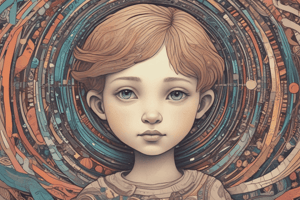Podcast
Questions and Answers
What stage in Piaget's theory is characterized by the child learning to represent objects with words and images?
What stage in Piaget's theory is characterized by the child learning to represent objects with words and images?
- Formal Operational
- Preoperational (correct)
- Sensorimotor
- Concrete Operational
What concept in Piaget's theory allows a child to understand that an object remains the same despite changes in appearance?
What concept in Piaget's theory allows a child to understand that an object remains the same despite changes in appearance?
- Conservation (correct)
- Assimilation
- Accommodation
- Object Permanence
Maria Montessori's educational philosophy is best described as:
Maria Montessori's educational philosophy is best described as:
- Promoting a competitive learning environment
- Strict adherence to a fixed curriculum
- Rote memorization and drill
- Guided discovery and independent learning (correct)
Which feature is typical of a Montessori classroom?
Which feature is typical of a Montessori classroom?
Vygotsky's concept of the 'zone of proximal development' emphasizes the:
Vygotsky's concept of the 'zone of proximal development' emphasizes the:
According to Vygotsky, the role of language is significant in:
According to Vygotsky, the role of language is significant in:
Freud's theory places emphasis on which aspect of personality development?
Freud's theory places emphasis on which aspect of personality development?
The Oedipus complex, according to Freud, typically occurs during which stage of development?
The Oedipus complex, according to Freud, typically occurs during which stage of development?
What is the psychosocial crisis that occurs during adolescence?
What is the psychosocial crisis that occurs during adolescence?
Which theorist is known for emphasizing social interaction and cultural tools in child development?
Which theorist is known for emphasizing social interaction and cultural tools in child development?
The concept of 'scaffolding' is most closely associated with which theorist?
The concept of 'scaffolding' is most closely associated with which theorist?
Which theorist proposed that children learn best through exploration and curiosity?
Which theorist proposed that children learn best through exploration and curiosity?
The concepts of id, ego, and superego are associated with which theorist?
The concepts of id, ego, and superego are associated with which theorist?
Which theorist emphasized the importance of play in child development?
Which theorist emphasized the importance of play in child development?
What stage of cognitive development does 'object permanence' belong to according to Piaget?
What stage of cognitive development does 'object permanence' belong to according to Piaget?
Which theorist is associated with the 'oral stage' of psychosexual development?
Which theorist is associated with the 'oral stage' of psychosexual development?
Flashcards are hidden until you start studying
Study Notes
Piaget's Theory of Cognitive Development
- Sensorimotor Stage: Infants learn through sensory experiences and motor actions. They develop object permanence, the understanding that objects continue to exist even when they are not visible.
- Preoperational Stage: Children learn to use language and symbols to represent objects. They engage in imaginative play but have difficulty with logical thinking and conservation.
- Concrete Operational Stage: Children develop logical thinking abilities and can perform concrete operations, such as understanding conservation.
- Formal Operational Stage: Individuals develop abstract thinking skills and can reason hypothetically.
Montessori Education
- Emphasizes: Student-centered learning, self-directed exploration, and hands-on experience.
- Classroom Design: Includes prepared learning environments with a variety of materials that promote sensory exploration, independent problem-solving, and self-regulation.
Vygotsky's Sociocultural Theory
- Zone of Proximal Development: Refers to the range of tasks a child can accomplish with guidance and support from a more knowledgeable individual (e.g., teacher, parent).
- Scaffolding: The process of providing support to a learner, gradually withdrawing the support as their understanding develops.
- Language: Plays a crucial role in cognitive development, social interaction, and shaping thought processes.
Freud's Psychoanalytic Theory
- Emphasis: Unconscious drives and early childhood experiences play a significant role in personality development.
- Id, Ego, Superego: Components of personality:
- Id: The impulsive and pleasure-seeking part.
- Ego: The mediator between the id and the superego, seeking to balance desires with reality.
- Superego: The internalized moral compass, representing societal rules and expectations.
- Psychosexual Stages:
- Oral Stage: (birth to 18 months) Focus on pleasure through the mouth.
- Anal Stage: (18 months to 3 years) Focus on pleasure through bowel control.
- Phallic Stage: (3 to 6 years) Focus on pleasure through the genitals.
- Latency Stage: (6 to puberty) Sexual impulses are dormant.
- Genital Stage: (puberty onward) Reawakening of sexual impulses.
Erikson's Psychosocial Theory
- Focus: Social interactions and cultural factors shape personality development throughout the lifespan.
- Psychosocial Stages: Each stage has its own specific social and emotional conflicts that individuals must resolve:
- Trust vs. Mistrust (birth to 1 year): Developing trust in caregivers and others.
- Autonomy vs. Shame and Doubt (1 to 3 years): Developing independence and self-confidence.
- Initiative vs. Guilt (3 to 5 years): Developing a sense of purpose and self-direction.
- Industry vs. Inferiority (5 to 12 years): Developing a sense of competence and achievement.
- Identity vs. Role Confusion (adolescence): Developing a sense of self and identity.
- Intimacy vs. Isolation (young adulthood): Developing intimate relationships.
- Generativity vs. Stagnation (middle adulthood): Contributing to society and the next generation.
- Ego Integrity vs. Despair (late adulthood): Accepting one's life and finding meaning in it.
Combined Theories
- Vygotsky emphasized the role of social interaction and cultural tools in child development.
- Vygotsky developed the concept of "scaffolding".
- Montessori believed that children are naturally curious learners and encouraged exploration.
- Freud introduced the concepts of "id", "ego", and "superego".
- Montessori emphasized the importance of play.
- Piaget believed that children develop through a series of cognitive stages.
- Piaget identified "object permanence" as developing during the sensorimotor stage.
- Freud developed the "oral stage" of psychosexual development.
- Montessori stressed the importance of a prepared environment for learning.
- Erikson introduced the "trust vs. mistrust" stage of psychosocial development.
Studying That Suits You
Use AI to generate personalized quizzes and flashcards to suit your learning preferences.




